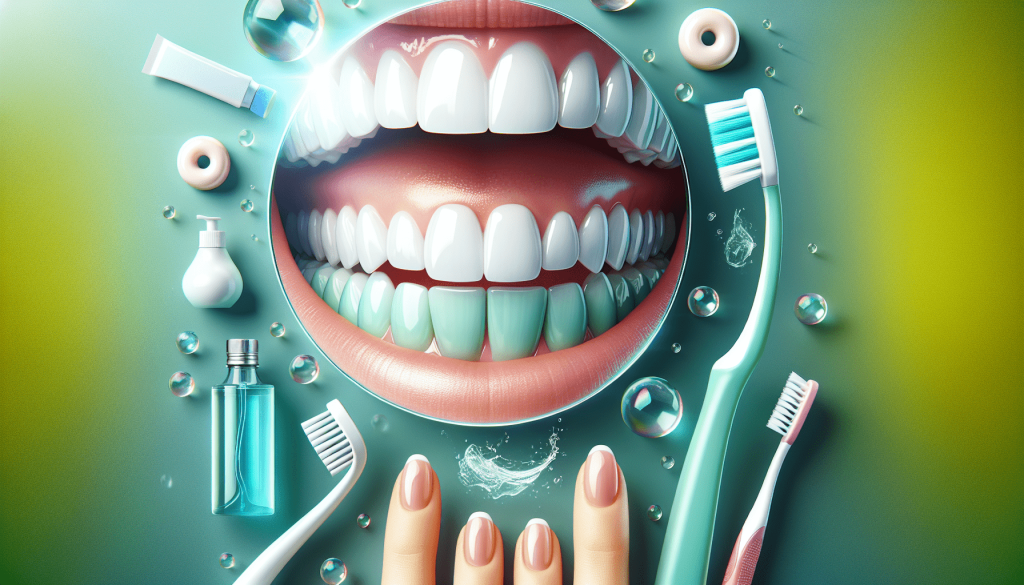What Are The Signs Of Poor Oral Hygiene?
Maintaining good oral hygiene is essential for a healthy smile, but do you know the signs of poor oral hygiene to watch out for? Neglecting your dental care can lead to a range of oral health problems, but fear not, because we’re here to help you identify those telltale signs. From persistent bad breath to gum inflammation, this article will explore the signs that may indicate poor oral hygiene and offer tips for maintaining a beautiful and healthy smile. So, let’s get started on the path to optimal oral health!

By visual observation
Discolored or yellow teeth
One of the signs of poor oral hygiene that you may notice through visual observation is discolored or yellow teeth. When you don’t brush and floss regularly, plaque and tartar can build up on your teeth, leading to staining and discoloration. This can make your teeth appear yellow or even brown in severe cases. Discolored teeth not only affect your appearance but can also indicate that you have poor oral health.
Swollen or bleeding gums
Another visual sign of poor oral hygiene is swollen or bleeding gums. Healthy gums should be pink and firm, but if they appear red, swollen, or bleed easily, it may indicate gum disease. When plaque and tartar build up along the gumline, it can irritate the gums, leading to inflammation and bleeding. Ignoring these signs can lead to serious oral health issues, such as gum disease and even tooth loss.
Persistent bad breath
Bad breath, also known as halitosis, can be a strong indicator of poor oral hygiene. When you neglect to brush and floss regularly, food particles and bacteria can accumulate in your mouth, releasing foul-smelling gases. This can result in persistent bad breath that is difficult to mask with mints or mouthwash alone. Addressing the root cause of your bad breath by improving your oral hygiene habits will help keep your breath fresh and your mouth healthy.
Visible plaque or tartar buildup
One of the most visible signs of poor oral hygiene is the presence of plaque or tartar on your teeth. Plaque is a sticky film of bacteria that forms on your teeth throughout the day. If not removed through regular brushing and flossing, it can harden into tartar, which is a yellow or brownish substance that adheres to your teeth. Not only does tartar make your teeth look unsightly, but it can also contribute to tooth decay and gum disease if left untreated.
Receding gumline
A receding gumline is a clear indication of poor oral hygiene. When you neglect to take care of your oral health, the gums can start to pull away from the teeth, exposing the roots. This can lead to tooth sensitivity, increased risk of tooth decay, and even tooth loss. Gum recession can be caused by gum disease, aggressive brushing, or poor oral hygiene habits.
By physical sensation
Tooth pain or sensitivity
One of the physical sensations that can indicate poor oral hygiene is tooth pain or sensitivity. When your oral hygiene is lacking, plaque and tartar can build up on your teeth, leading to tooth decay. As the decay progresses, it can cause the tooth to become sensitive to hot or cold temperatures and even cause sharp pain. Tooth pain or sensitivity should never be ignored, as it can be a sign of more significant dental problems that require professional treatment.
Gum sensitivity or pain
Poor oral hygiene can also lead to gum sensitivity or pain. When plaque and tartar accumulate along the gumline, they can irritate and inflame the gums. This can result in gum sensitivity, making it uncomfortable to brush or floss properly. If left untreated, the sensitivity may progress to gum pain, which can significantly impact your overall oral health and well-being.
Mouth sores or ulcers
Another physical sensation that can indicate poor oral hygiene is the presence of mouth sores or ulcers. When your oral health is compromised, the tissues in your mouth become more susceptible to infection and irritation. This can lead to the development of painful mouth sores or ulcers. If you consistently experience mouth sores, it may be time to evaluate your oral hygiene habits and seek professional dental care.
By oral health issues
Tooth decay or cavities
One of the major oral health issues associated with poor oral hygiene is tooth decay or cavities. When you don’t brush and floss regularly, plaque and tartar can accumulate on your teeth, leading to the breakdown of tooth enamel. This can create small holes or cavities in your teeth, which can progress and cause pain or require fillings or more extensive dental work. Tooth decay is preventable by practicing good oral hygiene and visiting your dentist regularly.
Gum disease (gingivitis or periodontitis)
Another oral health issue that can arise from poor oral hygiene is gum disease. Gingivitis is the early stage of gum disease and is characterized by inflamed gums that bleed easily. If left untreated, gingivitis can progress to periodontitis, a more advanced stage of gum disease that can lead to tooth loss and other complications. Maintaining proper oral hygiene, including regular brushing, flossing, and professional dental cleanings, is crucial in preventing and treating gum disease.
Tooth loss
Tooth loss is a severe consequence of poor oral hygiene. When plaque and tartar build up along the gumline and between the teeth, they can cause gum disease, which can lead to the deterioration of the supporting tissues and bone that hold your teeth in place. As a result, your teeth become loose and may eventually fall out. Effective oral hygiene practices, along with regular dental check-ups, can help preserve your natural teeth and prevent tooth loss.
By overall health indicators
Increased risk of heart disease
Poor oral hygiene can have implications for your overall health, including an increased risk of heart disease. Research suggests that the bacteria present in gum disease can enter the bloodstream and contribute to inflammation in the arteries, potentially leading to conditions like heart disease, stroke, or clogged arteries. By practicing good oral hygiene, you can help reduce the risk of gum disease and its potential impact on your cardiovascular health.
Compromised immune system
Your oral health and immune system are closely connected. When you neglect your oral hygiene, harmful bacteria can proliferate in your mouth, causing infections and inflammation. This chronic inflammation can weaken your immune system, making it less effective at fighting off other illnesses and infections. Taking care of your oral health by brushing, flossing, and maintaining regular dental visits can help support a strong immune system.
Respiratory problems
There is evidence to suggest that poor oral hygiene can contribute to respiratory problems. Bacteria present in the mouth, particularly in conditions like gum disease, can enter the respiratory tract and potentially contribute to infections such as pneumonia. By practicing good oral hygiene, you can help reduce the presence of harmful bacteria in your mouth and lower the risk of developing respiratory issues.

By daily habits and routines
Lack of regular brushing and flossing
A clear indicator of poor oral hygiene is when you routinely neglect to brush and floss your teeth. Brushing twice a day and flossing at least once a day are essential for removing plaque and food particles, preventing tooth decay, and maintaining healthy gums. Failing to follow these basic oral hygiene habits can lead to a host of oral health problems.
Skipping dental check-ups
Skipping dental check-ups is another habit that reflects poor oral hygiene. Regular dental visits are crucial for preventive care, as dentists can identify and address any potential problems early on. Professional dental cleanings also remove plaque and tartar build-up that cannot be effectively removed at home. By attending regular dental check-ups, you can catch and treat any oral health issues before they become more significant and more costly to address.
Unhealthy diet and lifestyle
Your diet and lifestyle choices can have a significant impact on your oral hygiene. Consuming excessive amounts of sugary and acidic foods and beverages can contribute to tooth decay and gum disease. Additionally, smoking and excessive alcohol consumption can also harm your oral health. By adopting a balanced diet and incorporating healthier lifestyle choices, you can greatly improve your oral hygiene and overall well-being.
In conclusion, it is essential to pay attention to the signs of poor oral hygiene in order to maintain a healthy mouth and overall well-being. By regularly brushing and flossing, attending dental check-ups, and adopting a healthy lifestyle, you can prevent a host of oral health problems and enjoy a confident smile. Remember, taking care of your oral hygiene not only benefits your mouth but also contributes to your overall health.
Additional Resources








